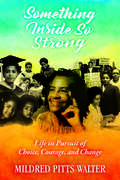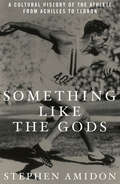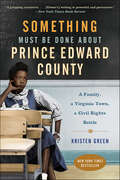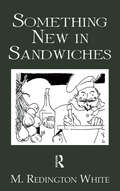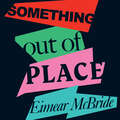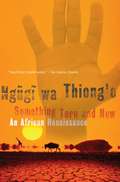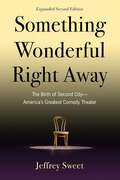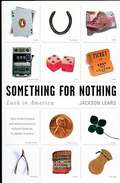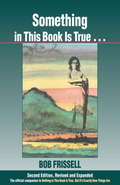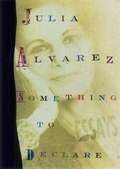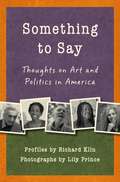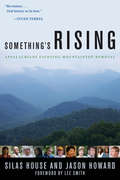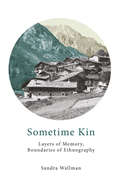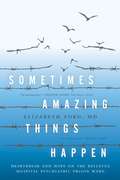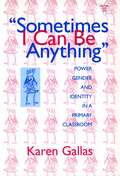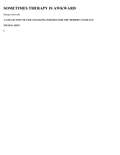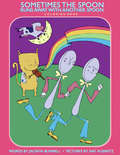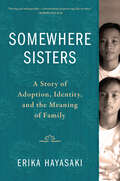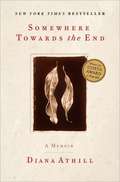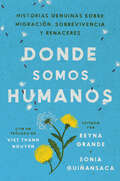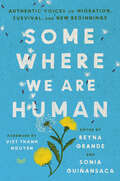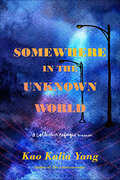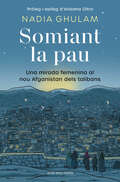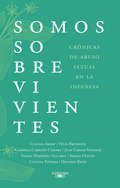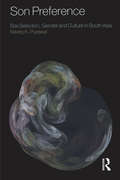- Table View
- List View
Something Inside So Strong: Life in Pursuit of Choice, Courage, and Change (Willie Morris Books in Memoir and Biography)
by Mildred Pitts WalterIn 1922, Mildred Pitts Walter was born in DeRidder, Louisiana, to a log cutter and a midwife/beautician. She became the first member of her family to go to college, graduating in 1940. Walter moved to California, where she worked as an elementary school teacher. After being encouraged by a publisher to write books for and about African American children, Walter went on to become a pioneer of African American children's literature. Most notably, she wrote Justin and the Best Biscuits in the World, which bent preconceptions with tales of black cowboys and men doing “women’s work.” She was also a contributing book reviewer to the Los Angeles Times. In Something Inside So Strong: Life in Pursuit of Choice, Courage, and Change, Walter recollects major touchstones in her life. The autobiography, divided into three parts, “Choice,” “Courage,” and “Change,” covers Walter’s life beginning with her childhood in the 1920s and moving to the present day. In “Choice,” Walter describes growing up in a deeply segregated Louisiana and includes memories of school, rural home life, World War II, and participating in neighborhood activities like hog killing and church revivals. “Courage” documents her adjustment to living away from family, her experiences teaching in Los Angeles, and her extensive work with her husband for the Los Angeles chapter of the Congress of Racial Equality. The final section, “Change,” shows how Walter’s writing and activism merged, detailing her work as an education consultant and as an advocate for nonviolent resistance to racism. It also reveals how her world travels expanded her personal inquiry into Christianity and African spirituality. Something Inside So Strong is one woman’s journey to self-discovery.
Something Like the Gods: A Cultural History of the Athlete from Achilles to LeBron
by Stephen AmidonA lively, literary exploration of one of the West's most iconic cultural figures—the athlete Why is the athlete so important to us? Few public figures can dominate the public imagination with such power and authority. Even in our cynical times, when celebrities can be debunked at the speed of light, many still look to athletes as models for our moral and emotional lives. An aging fastballer goes for a few last wins in his final season, and he becomes an exemplar for our daily struggles against time. A top golfer cheats on his wife, and his behavior sparks a symposium on marital fidelity more wideranging than if the lapse had come from a politician or religious leader. Drawing from art, literature, politics, and history, Something Like the Gods explores the powerful grip the athlete has always held on the Western imagination. Amidon examines the archetype of the competitor as it evolved from antiquity to the present day, from athlete-warriors such as Achilles and Ulysses to global media icons like Ali, Jordan, and Tiger Woods. Above all, Something Like the Gods is a lyrical study that will appeal to anyone who has ever imagined themselves in the spikes, boots, or sneakers of our greatest athletes—or wondered why people do.
Something Must Be Done About Prince Edward County: A Family, a Virginia Town, a Civil Rights Battle
by Kristen GreenThe provocative true story of one Virginia school system’s refusal to integrate after the US Supreme Court declared school segregation unconstitutional.A New York Times BestsellerA Washington Post Notable Book of the YearIn the wake of the Supreme Court’s unanimous Brown v. Board of Education decision, Virginia’s Prince Edward County refused to obey the law. Rather than desegregate, the county closed its public schools, locking and chaining the doors. The community’s white leaders quickly established a private academy, commandeering supplies from the shuttered public schools to use in their all-white classrooms. Meanwhile, black parents had few options: keep their kids at home, move across county lines, or send them to live with relatives in other states. For five years, the schools remained closed.Kristen Green, a longtime newspaper reporter, grew up in Farmville and attended Prince Edward Academy, which did not admit black students until 1986. In her journey to uncover what happened in her hometown before she was born, Green tells the stories of families divided by the school closures and of 1,700 black children denied an education. As she peels back the layers of this haunting period in our nation’s past, her own family’s role—no less complex and painful—comes to light.Praise for Something Must Be Done About Prince Edward County“[Green’s] thoughtful book is a gift to a new generation of readers who need to know this story.” —Washington Post“A gripping narrative. . . . [Green’s] writing is powerful and persuasive.” —New York Times Book Review“Intimate and candid.” —Richmond Times-Dispatch“Not easily forgotten.” —Minneapolis Star Tribune
Something New In Sandwiches
by WhiteFirst published in 2005. Routledge is an imprint of Taylor & Francis, an informa company.
Something Out of Place: Women & Disgust
by Eimear McBrideIn her blistering non-fiction debut, Eimear McBride unpicks the contradictory forces of disgust and objectification that control and shame women. From playground taunts of 'only sluts do it' but 'virgins are frigid', to ladette culture, and the arrival of 'ironic' porn, via Debbie Harry, the Kardashians and the Catholic church - she looks at how this prejudicial messaging has played out in the past, and still surround us today.In this subversive essay, McBride asks - are women still damned if we do, damned if we don't? How can we give our daughters (and sons) the unbounded futures we want for them? And, in this moment of global crisis, might our gift for juggling contradiction help us to find a way forward?
Something Torn and New: An African Renaissance
by Ngugi Wa Thiong'ONovelist Ngugi wa Thiong'o has been a force in African literature for decades: Since the 1970s, when he gave up the English language to commit himself to writing in African languages, his foremost concern has been the critical importance of language to culture. In Something Torn and New, Ngugi explores Africa's historical, economic, and cultural fragmentation by slavery, colonialism, and globalization. Throughout this tragic history, a constant and irrepressible force was Europhonism: the replacement of native names, languages, and identities with European ones. The result was the dismemberment of African memory. Seeking to remember language in order to revitalize it, Ngugi's quest is for wholeness. Wide-ranging, erudite, and hopeful, Something Torn and New is a cri de coeur to save Africa's cultural future.
Something Wonderful Right Away: The Birth of Second City—America's Greatest Comedy Theater
by Jeffrey SweetDiscover the behind-the-scenes story of how The Second City theater created a generation of world class great actors, directors, and writers. In the late Fifties and Sixties, iconoclastic young rebels in Chicago opened two tiny theaters—The Compass and The Second City—where they satirized politics, religion, and sex. Building scenes by improvising based on audience suggestions turned out to be a fine way to develop great actors, directors, and writers. Alumni went on to create such groundbreaking works as The Graduate, Groundhog Day, and Don&’t Look Up. Many of them also became stars on Saturday Night Live. Something Wonderful Right Away features the pioneers of the empire that transformed American comedy. This new edition tells even more of the story. Included for the first time is an interview with Viola Spolin, the genius who invented theater games that were the foundation of improvisational theater. Also included are dozens of follow-up stories about Mike Nichols, Barbara Harris, Del Close, Joan Rivers, Alan Arkin, and Gilda Radner, plus &“You Only Shoot the Ones You Love,&” the story of how this book&’s author, playwright Jeffrey Sweet, became so involved in the community he covered that he was captured by it.
Something for Nothing: Luck in America
by Jackson LearsPrizewinning historian Jackson Lears has now written the most important, most wide-ranging, and most original book of his career. In Something for Nothing Lears documents how America's culture of control is inextricably entwined with its culture of chance. <P> Conventional wisdom has it that the Protestant ethic of hard work and self-control is what made America great, but a deep, seldom acknowledged reverence for luck runs through our history as well. Americans have embraced the seductive whims of chance, from African fortune-telling to Puritan folk superstitions right up to the current resurgence of casinos and lotteries. Drawing on a vast body of research, Lears ranges through the entire sweep of American history as he uncovers the hidden influence of risk taking, conjuring, soothsaying, and sheer dumb luck on our culture, politics, social lives, and economy. <P> Written with impressive clarity and authority, Something for Nothing will be compared to Louis Menand's bestselling The Metaphysical Club and Ann Douglas's Terrible Honesty: Mongrel Manhattan in the 1920s. This is cultural history at its best-challenging, eye opening, deeply learned, and as surprising as it is illuminating.
Something in This Book Is True, Second Edition: The Official Companion to Nothing in This Book Is True, But It's Exactly How Things Are
by Bob FrissellA training manual for navigating a future full of danger and hope, this book considers earth changes, pole shifts, Hopi prophecies, the secret government, and much more. Written in Bob Frissell's warm, personal style with updated commentary, Something in This Book Is True is both an account of Frissell's journey to inner discovery and empowerment and a most unusual reader's guide. Delving into topics as eclectic as polarity consciousness, emotional body clearing, and higher selves, Frissell affirms that humanity is composed of spiritual beings having human experiences--not vice versa. This new edition incorporates photos and illustrations into Frissell's engaging text.From the Trade Paperback edition.
Something to Declare
by Julia AlvarezThe book is a collection of twenty-four autobiographical essays of the author. In the book she describes her beautiful childhood in the Dominican Republic and her difficulties when she grew up.
Something to Say
by Lily Prince Richard Klin"Klin is an insightful interviewer and a marvelous writer. We were delighted to have the opportunity to publish the interview with Howard Zinn from Something to Say."-The Bloomsbury ReviewThe fusion of art and politics is axiomatic in much of the world. In America, their relationship is erratic. What is art in the service of social justice? Is an artist obligated to address the political? This book profiles, in words and photos, disparate creative forces who offer thoughts on their point of engagement with the political sphere. In the words of Pete Seeger, art "may save the world. Visual arts, dancing, acting arts, cooking arts. . . . Joe DiMaggio reaching for a fly ball-that was great dancing!"Profiles in Something to Say:The late Howard ZinnPete SeegerYoko OnoScreenwriter Ron NyswanerPalestinian American standup comedian Maysoon ZayidPoet Quincy TroupeDominican American painter Freddy RodríguezFilmmaker Gini RetickerSlowpoke cartoonist Jen SorensenPerformance and installation artist Sheryl OringChildren's writer Jacqueline WoodsonChef and food activist Didi EmmonsChinese American poet and art critic John YauPunk-rock activist Franklin Stein of the band BlowbackKlezmer fiddler Alicia SvigalsRichard Klin's writing has appeared in the Brooklyn Rail, Forward, The Bloomsbury Review, Parabola, The Rambler, and other media.Lily Prince has exhibited in over fifty national and international exhibitions and has been awarded commissions by numerous hotels and the NYC Department of Cultural Affairs. She is an associate professor of art at William Paterson University. Her work has appeared in The New York Times, New York Magazine, Newark Star-Ledger, New American Paintings, San Francisco Weekly, and other media.
Something's Rising: Appalachians Fighting Mountaintop Removal
by Silas House Jason HowardTwo Appalachian authors record personal stories of local resistance against the coal industry in this &“revelatory work . . . oral history at its best&” (Studs Terkel). Developed as an alternative to strip mining, mountaintop removal mining consists of blasting away the tops of mountains, dumping waste into the valleys, and retrieving the exposed coal. This process buries streams, pollutes wells and waterways, and alters fragile ecologies—all of which has a devastating impact on local communities. Something's Rising gives a stirring voice to the lives, culture, and determination of the people fighting this destructive practice in the coalfields of central Appalachia. The people who live, work, and raise families here face not only the destruction of their land but also the loss of their culture and health. Each person's story, unique and unfiltered, is prefaced with a biographical essay that vividly establishes the interview settings and the subjects' connections to their region. Included here are oral histories from Jean Ritchie, "the mother of folk," who doesn't let her eighty-six years slow down her fighting spirit; Judy Bonds, a tough-talking coal-miner's daughter; Kathy Mattea, the beloved country singer who believes cooperation is the key to winning the battle; Jack Spadaro, the heroic whistle-blower who has risked everything to share his insider knowledge of federal mining agencies; Larry Bush, who doesn't back down even when speeding coal trucks are used to intimidate him; Denise Giardina, a celebrated writer who ran for governor to bring attention to the issue; and many more.
Sometime Kin: Layers of Memory, Boundaries of Ethnography
by Sandra WallmanIn Sometime Kin Sandra Wallman paints the portrait of an Alpine settlement – its history, economy and culture, and its unusual resistance to outsiders and modernization. Against this, journal extracts show the villagers embracing her four small children and acting as participant observers in the two-way process of research. This project happened more than forty years ago and involved a uniquely large fieldwork family, but its insights have wider significance. The book argues that the intrusion of observation inevitably distorts the ordinary life observed; that the challenges of multi-vocality and “truth” are always with us; and that memory is the bedrock of every ethnographic enterprise.
Sometimes Amazing Things Happen: Heartbreak and Hope on the Bellevue Hospital Psychiatric Prison Ward
by Elizabeth FordFrom the Executive Director of Mental Health for Correctional Services in New York City, comes a revelatory and deeply compassionate memoir that takes readers inside Bellevue, and brings to life the world—the system, the staff, and the haunting cases—that shaped one young psychiatrist as she learned how to doctor and how to love. Elizabeth Ford went through medical school unsure of where she belonged. It wasn’t until she did her psychiatry rotation that she found her calling—to care for one of the most vulnerable populations of mentally ill people, the inmates of New York's jails, including Rikers Island, who are so sick that they are sent to the Bellevue Hospital Prison Ward for care. These men were broken, unloved, without resources or support, and very ill. They could be violent, unpredictable, but they could also be funny and tender and needy. Mostly, they were human and they awakened in Ford a boundless compassion. Her patients made her a great doctor and a better person and, as she treated these men, she learned about doctoring, about nurturing, about parenting, and about love. While Ford was a psychiatrist at Bellevue she becomes a wife and a mother. In her book she shares her struggles to balance her life and her work, to care for her children and her patients, and to maintain the empathy that is essential to her practice—all in the face of a jaded institution, an exhausting workload, and the deeply emotionally taxing nature of her work. Ford brings humor, grace, and humanity to the lives of the patients in her care and in beautifully rendered prose illuminates the inner workings (and failings) of our mental health system, our justice system, and the prison system.
Sometimes I Can Be Anything: Power, Gender, and Identity in a Primary Classroom (The practitioner inquiry series)
by Karen GallasIn her third book, Sometimes I Can Be Anything, Karen Gallas explores young children’s experience and understanding of gender, race, and power as revealed by the interactions within her first and second grade classroom. Presenting classroom research conducted over a four-year period, this experienced teacher-researcher focuses on the ways in which children collectively develop their social world.
Sometimes Therapy is Awkward: A Collection of Life-Changing Insights for the Modern Clinician
by Nicole ArztSometimes therapy is awkward. And sometimes it's also painful, messy, and downright confusing. Yet, very few books capture what it's truly like to engage in this work. Instead, most books paint a picture-perfect ideal of psychotherapists and their abilities to support their clients. <p><p>This guide chronicles the strange nuances of working in mental health in the modern world. Sometimes Therapy Is Awkward provides refreshingly candid insight into what it takes to feel more confident and prepared to help others.
Sometimes the Spoon Runs Away with Another Spoon (Reach and Teach)
by Jacinta Bunnell Nat KusinitzRe-creating nursery rhymes and fairy tales, this radical activity book takes anecdotes from the lives of real kids and mixes them with classic tales to create true-to-life characters, situations, and resolutions. Featuring massive beasts who enjoy dainty, pretty jewelry and princesses who build rocket ships, this fun-for-all-ages coloring book celebrates those who do not fit into disempowering gender categorizations, from sensitive boys to tough girls.
Somewhere Sisters: A Story of Adoption, Identity, and the Meaning of Family
by Erika HayasakiAn NPR Best Book of 2022 An incredible, deeply reported story of identical twins Isabella and Hà, born in Viêt Nam and raised on opposite sides of the world, each knowing little about the other&’s existence until they were reunited as teenagers, against all odds. &“Stirring and unforgettable—a breathtaking adoption saga like no other.&” —Robert Kolker It was 1998 in Nha Trang, Việt Nam, and Liên struggled to care for her newborn twin girls. Hà was taken in by Liên&’s sister, and she grew up in a rural village with her aunt, going to school and playing outside with the neighbors. They had sporadic electricity and frequent monsoons. Hà&’s twin sister, Loan, was adopted by a wealthy, white American family who renamed her Isabella. Isabella grew up in the suburbs of Chicago with a nonbiological sister, Olivia, also adopted from Việt Nam. Isabella and Olivia attended a predominantly white Catholic school, played soccer, and prepared for college. But when Isabella&’s adoptive mother learned of her biological twin back in Việt Nam, all of their lives changed forever. Award-winning journalist Erika Hayasaki spent years and hundreds of hours interviewing each of the birth and adoptive family members. She brings the girls&’ experiences to life on the page, told from their own perspectives, challenging conceptions about adoption and what it means to give a child a good life. Hayasaki contextualizes the sisters&’ experiences with the fascinating and often sinister history of twin studies, intercountry and transracial adoption, and the nature-versus-nurture debate, as well as the latest scholarship and conversation surrounding adoption today, especially among adoptees. For readers of All You Can Ever Know and American Baby, Somewhere Sisters is a richly textured, moving story of sisterhood and coming of age, told through the remarkable lives of young women who have redefined the meaning of family for themselves.
Somewhere Towards the End
by Diana AthillFar from the carefree advertising image of grey power Saga holidays, this is the process of approaching the end, with all its grisly possibilities. Athill, at least, has reached the age of 90 with precious few regrets about her life.
Somewhere We Are Human \ Donde somos humanos (Spanish edition): Historias genuinas sobre migración, sobrevivencia y renaceres
by Reyna Grande Sonia GuiñansacaCon una introducción del ganador del Premio Pulitzer, Viet Thanh Nguyen, En algún lugar somos humano es una antología de cuarenta y cuatro ensayos y poemas atrevidos, importantes y revolucionarios escritos por inmigrantes, refugiados y Dreamers, incluidos escritores galardonados, artistas y activistas, que iluminan la realidad del día a día de un indocumentado. Hoy en día, existe un efusivo debate sobre el tema de la inmigración en los Estados Unidos, pero se pierde de vista lo más importante: que los migrantes y refugiados viviendo precariamente en este país son madres y padres, hermanos y hermanas, hijos e hijas; individuos impulsados por la esperanza y el miedo que se juegan la vida con la promesa del sueño americano. Sus historias, sin embargo, caen a menudo en el olvido.En estos tiempos de inquietudes, agitación política e incertidumbre, esta antología de ensayos, poesía y arte intenta transformar la xenófoba y estereotipada perspectiva colectiva que tenemos sobre los inmigrantes y refugiados en una basada en la justicia y humanidad. Les autores de esta colección alterarán la visión que tienen de sí mismes y de sus respectivas comunidades a través de la narración y el arte para así declarar orgullosamente que, tanto aquí como en cualquier otro lugar, todos somos humanos a pesar de la militarización de las fronteras, la detención masiva y la legislación draconiana y antiinmigrante en los Estados Unidos.En algún lugar somos humanos revela cómo la alegría, la esperanza, el duelo y la perseverancia nos ayudan a florecer en los terrenos más áridos y en las condiciones más extremas.
Somewhere We Are Human: Authentic Voices on Migration, Survival, and New Beginnings
by Reyna Grande Sonia Guiñansaca""Wide-ranging yet consistently affecting, these pieces offer a crucial and inspired survey of the immigrant experience in America."" –Publishers Weekly"[These contributions] touch on so many different facets of the immigrant experience that readers will find much to ponder... [and] experience how creative writing enriches our understanding of each other and our lives." –BooklistIntroduction by Pulitzer Prize–winning author Viet Thanh NguyenA unique collection of 41 groundbreaking essays, poems, and artwork by migrants, refugees and Dreamers—including award-winning writers, artists, and activists—that illuminate what it is like living undocumented today.In the overheated debate about immigration, we often lose sight of the humanity at the heart of this complex issue. The immigrants and refugees living precariously in the United States are mothers and fathers, children, neighbors, and friends. Individuals propelled by hope and fear, they gamble their lives on the promise of America, yet their voices are rarely heard.This anthology of essays, poetry, and art seeks to shift the immigration debate—now shaped by rancorous stereotypes and xenophobia—towards one rooted in humanity and justice. Through their storytelling and art, the contributors to this thought-provoking book remind us that they are human still. Transcending their current immigration status, they offer nuanced portraits of their existence before and after migration, the factors behind their choices, the pain of leaving their homeland and beginning anew in a strange country, and their collective hunger for a future not defined by borders.Created entirely by undocumented or formerly undocumented migrants, Somewhere We Are Human is a journey of memory and yearning from people newly arrived to America, those who have been here for decades, and those who have ultimately chosen to leave or were deported. Touching on themes of race, class, gender, nationality, sexuality, politics, and parenthood, Somewhere We Are Human reveals how joy, hope, mourning, and perseverance can take root in the toughest soil and bloom in the harshest conditions.
Somewhere in the Unknown World: A Collective Refugee Memoir
by Kao Kalia YangFrom “an exceptional storyteller,” Somewhere in the Unknown World is a collection of powerful stories of refugees who have found new lives in Minnesota’s Twin Cities, told by the award-winning author of The Latehomecomer and The Song Poet.All over this country, there are refugees. But beyond the headlines, few know who they are, how they live, or what they have lost. Although Minnesota is not known for its diversity, the state has welcomed more refugees per capita than any other, from Syria to Bosnia, Thailand to Liberia. Now, with nativism on the rise, Kao Kalia Yang—herself a Hmong refugee—has gathered stories of the stateless who today call the Twin Cities home.Here are people who found the strength and courage to rebuild after leaving all they hold dear. Awo and her mother, who escaped from Somalia, reunite with her father on the phone every Saturday, across the span of continents and decades. Tommy, born in Minneapolis to refugees from Cambodia, cannot escape the war that his parents carry inside. As Afghani flees the reach of the Taliban, he seeks at every stop what he calls a certificate of his humanity. Mr. Truong brings pho from Vietnam to Frogtown in St. Paul, reviving a crumbling block as well as his own family.In Yang’s exquisite, necessary telling, these fourteen stories for refugee journeys restore history and humanity to America's strangers and redeem its long tradition of welcome.
Somiant la pau: Una mirada femenina al nou Afganistan dels talibans
by Nadia GhulamAgost del 2021. La narradora i activista afganesa Nadia Ghulam, veient que els talibans avançen per l'Afganistan, comença a moure's desesperadament per poder ajudar els seus. Aquestes pàgines van néixer després de converses entre la Nadia i la periodista Ariadna Oltra, en les quals van parlar de com han viscut aquest darrer any ella i els seus familiars, el que va haver de fer per aconseguir portar a Espanya part de la seva família i el que estan vivint a Kabul els que no han pogut marxar. La història d'uns pocs i, tanmateix, la realitat de milers de famílies afganeses i d'altres llocs del món. Aquell agost, els mitjans de comunicació ens bombardejaven amb imatges esfereïdores d'homes que queien d'un avió mentre intentaven fugir desesperadament de l'ocupació. Després de mesos, ningú ens parla del que està passant allà, ni tampoc de com es troben les persones que van poder fugir i que han estat acollides a diferents llocs delplaneta. La veu de la Nadia és la de tots ells. Aquella nena afganesa que es va fer passar per un noi durant deu anys per poder tenir dels drets que com a dona li negaven, viu a Barcelona des d'en fa setze. El seu objectiu vital i el d'aquestes pàgines és ajudar les dones del seu país perquè puguin seguir estudiant i per aconseguir que esdevinguin «agents per la pau» per multiplicar-se en un Afganistan que torna a estar sota poder talibà.
Somos sobrevivientes: Crónicas de abuso sexual en la infancia
by Felix Bruzzone Claudia Piñeiro Sergio OlguínOcho escritores entrevistaron a ocho sobrevivientes de abuso sexual en la infancia y nos cuentan sus historias. ¿Cómo se narra el abuso? ¿Cómo se rompe el secreto que el abusador impone con amenazas? ¿Cómo se habla de un dolor y una vergüenza que la mayoría de las veces ocurre dentro de la familia? ¿Cómo se cuenta que alguien ha sido sometido por un padre, una madre, un hermano, un abuelo, un vecino? Este es un libro incómodo, habla de la violencia ejercida por adultos contra menores de edad que dejaron marcas y condicionaron sus vidas. Habla de situaciones difíciles que ocurrieron en infancias que no fueron cuidadas, en las que se abusó de su confianza, de su integridad física y de su salud mental. Ocho escritores escucharon a ocho sobrevivientes de abuso y contaron sus historias desde un lugar de empatía y de denuncia con la mejor herramienta que poseen: la palabra. Ahí donde el silencio es cómplice del abusador, la palabra es aliada de las víctimas. Las historias reflejadas en esta antología permiten ver más allá de lo silenciado, conectando dolores solitarios con el dolor común, en una invitación a dejar de callar y animarnos a soñar juntos con un futuro más luminoso. «Sentí mucha vergüenza: yo me había casado con esta bestia. De pronto soy esa nena y todos mis demonios me rodean, me dañan, me atomizan.»Claudia Aboaf habla con Silvia «Blas no es de hablar mucho [...]. Pero después de un tiempo sí, empezó a hablar. Antes de la denuncia, y antes de las amenazas [...]. Habla Blas. Dice encierros. Dice toqueteos. Habla de violencia física.»Félix Bruzzone habla con G. «Yo de chica fui abusada por un vecino. [...] ¿Y a quién le iba a decir en ese momento? Lo que esperaba todo el mundo era que mi papá abusara de mí o de alguno de mis hermanos, y no pasó. Pero este vecino sí.»Gabriela Cabezón Cámara habla con Nadia «Varias veces papá quiere entrar a mi cuarto, sigue convencido de que puede hacerme lo que quiere, grito antes que pueda ponerme una mano encima [...]. Mamá lo sabe y no hace nada.»Juan Carlos Kreimer habla con Tatiana «El psicólogo le preguntó su nombre, qué edad tenía, a qué colegio iba, cuántos hermanos..., finalmente le pidió que le dijera por qué estaba ahí. Sofía respiró profundo y le dijo que había sido violada por su padre.»Fabián Martínez Siccardi habla con Sofía «Equis le vendaba los ojos. Le hacía cosas o lo obligaba a que él las hiciera. Imposible que un nene de siete u ocho años pudiera saber que se había convertido en víctima de alguien diez años mayor, de alguien que él consideraba su amigo, el mayor de sus amigos.»Sergio Olguín habla con Jota «De parte del colegio, escuché argumentos inconcebibles [...]. Dijeron que lo que había hecho con nosotros era "un juego inapropiado", lo calificaron como "cosas feas". Y que gracias a esas acciones se había encendido "una luz amarilla". La luz amarilla apenas alcanzó para trasladarlo de localidad.»Claudia Piñeiro habla con Sebastián «Mi vida actual me gusta, a veces llego a sentirme orgullosa de mí misma. Pude sanar. Pero vive adentro mío la sombra de un silencio que supo ser el mandato más poderoso, un hueco en la memoria que me llevó a olvidar eso que de todas maneras regresaba una y otra vez hecho lágrimas, angustia y bronca.»Dolores Reyes habla con Silvia Beatiz
Son Preference: Sex Selection, Gender and Culture in South Asia
by Navtej K. PurewalThe preference for male children transcends many societies and cultures, making it an issue of local and global dimensions. While son preference is not a new phenomenon and has existed historically in many parts of Asia, its contemporary expressions illustrate the gendered outcomes of social power relations as they interact and intersect with culture, economy and technologies. Son Preference brings together key debates on the subject of son preference by assessing existing work in the field and providing new insights through primary research. The book covers a broad range of social science discussions and draws upon textual and ethnographic material from India. Son Preference will be useful to students, scholars, activists and anyone interested in the issues surrounding gender inequity, sex selection and skewed sex ratios.
